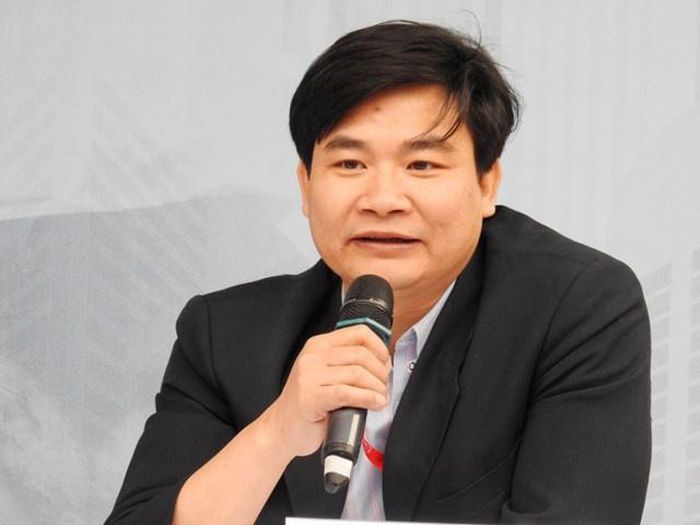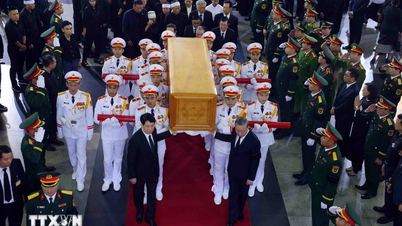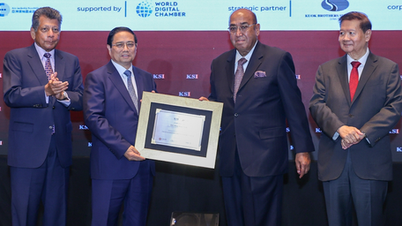According to a report from Hanoi Medical University, this year, the school did not have any students graduating with honors.
Of the 786 medical graduates (6 years), 11.3% graduated with honors, 69.8% with good grades, 17.6% with average grades, and 1.3% with average grades. In the bachelor's program (4 years), in 2024, of the 331 graduates, 3% graduated with honors, 56.8% with good grades, 56.8% with average grades, and 1.5% with average grades.
The rate of excellent and excellent graduates at Hanoi Medical University is somewhat "modest" compared to many other universities, especially in the field of Economics .
For example, in 2024, at Foreign Trade University, about 23.3% of students graduated with honors, about 49.9% of students were ranked as good. The rate of excellent and good students accounted for nearly 73.2%. National Economics University has not announced the data for 2024, however, in 2023, the rate of excellent and good students at the school also reached nearly 70% (26.04% of students graduated with honors, 42.06% of students graduated with honors).
In the engineering sector, in 2024, the number of students graduating with honors and excellent grades at Hanoi University of Science and Technology accounted for over 32% of the total number of students graduating early.

Speaking to reporters of the People's Representative Newspaper , Associate Professor, Dr. Le Dinh Tung, Vice Rector of Hanoi Medical University, shared that for majors in the health sector, the rate of students graduating with honors and distinctions is often not high compared to other majors. This is the current reality at medical schools nationwide, not just Hanoi Medical University.
According to Associate Professor Le Dinh Tung, this rate is not because the students are weak, because the input quality and admission standards of majors in the health sector are always very high.
Associate Professor Le Dinh Tung gave a number of reasons why the rate of students graduating with honors and distinctions at medical schools is often not high. The first issue is related to assessment and evaluation. Uh
Accordingly, the assessment and evaluation in schools in the health sector focuses on the ability to practice and perform clinical tasks or duties at facilities with very high requirements for medical examination and treatment. In addition to knowledge, there are also skills and professionalism such as teamwork or effective communication, ensuring patient safety as well as coordination with colleagues and other medical staff.
In addition, the assessment integrates both knowledge assessment, practice assessment and attitude assessment, making the assessment score on a 10-point scale lower than other training majors.
“The assessment focuses on working ability rather than on scores. We hope that employers will recruit based on meeting job requirements, that is, based on students’ abilities, rather than just focusing on the scores achieved,” said Associate Professor Le Dinh Tung.
He believes that if we only base on scores to evaluate and compare graduates in health fields with other fields, it will be a disadvantage for health students.
Besides, this can also affect the training organization, when the assessment and evaluation may no longer go in the right direction: instead of promoting the assessment of learners' capacity, so that they have real capacity, meeting the requirements of the job, of the employer when graduating, they promote learning to get points and get high scores, but the ability to meet the job is limited.

Regarding the question of whether the rate of excellent and excellent graduates each year should be used to evaluate the training quality of a university, Associate Professor Le Dinh Tung stated that this is a reference criterion that can be used as a basis for evaluation.
However, instead of relying solely on scores or percentages of good or excellent grades, assessment and evaluation activities need to include feedback from stakeholders, including students, alumni, and lecturers, and focus on meeting the output standards of training programs, as well as the goals that the school commits to society.
Associate Professor Le Dinh Tung said that for labor recruitment establishments, in addition to recruitment criteria based on qualifications and academic results, one of the additional criteria that must be added is the assessment of the ability to meet job requirements.
Accordingly, it is necessary to observe and evaluate students after graduation based on the probationary period to make accurate and objective comments and assessments. This also encourages training institutions, including those in the fields of Medicine, Nursing, and Dentistry, to focus on training, practicing, supporting, and helping students meet their capacity, instead of just studying for points or just studying for exams.
Regarding the training facility, Associate Professor Le Dinh Tung said that Hanoi Medical University will focus on training capable students. The school has consulted with various parties, including local health departments, hospitals, and practice facilities, on the students' capabilities as one of the bases for developing the program and organizing training.
At the same time, evaluation is based on meeting the tasks set for doctors, nurses, and health graduates so that graduates must first of all be professionals.
Graduates must also have basic scientific knowledge, solid foundational knowledge to be able to develop personally, work or think, and make decisions independently. At the same time, they must have sufficient knowledge, including knowledge of training in the major and knowledge of other fields.
Source: https://daibieunhandan.vn/giao-duc--y-te1/vi-sao-ty-le-sinh-vien-tot-nghiep-loai-gioi-xuat-sac-o-truong-dai-hoc-y-ha-noi-khong-cao--i384918/


![[Photo] Ea Yieng commune settlement project abandoned](https://vphoto.vietnam.vn/thumb/1200x675/vietnam/resource/IMAGE/2025/5/25/57a8177361c24ee9885b5de1b9990b0e)
![[PHOTO] Hanoi fences off demolition of "Shark Jaws" building](https://vphoto.vietnam.vn/thumb/1200x675/vietnam/resource/IMAGE/2025/5/25/1b42fe53b9574eb88f9eafd9642b5b45)

![[Photo] Welcoming ceremony for Prime Minister Pham Minh Chinh and his wife on an official visit to Malaysia](https://vphoto.vietnam.vn/thumb/1200x675/vietnam/resource/IMAGE/2025/5/25/dc30203c3ae24da3990266ec3b29bb2d)
![[Photo] French President Emmanuel Macron and his wife begin state visit to Vietnam](https://vphoto.vietnam.vn/thumb/1200x675/vietnam/resource/IMAGE/2025/5/25/03b59c7613144a35ba0f241ded642a59)
![[Photo] Funeral of former President Tran Duc Luong in Quang Ngai](https://vphoto.vietnam.vn/thumb/1200x675/vietnam/resource/IMAGE/2025/5/25/ccf19a3d8ea7450bb9afe81731b80995)



















































































Comment (0)